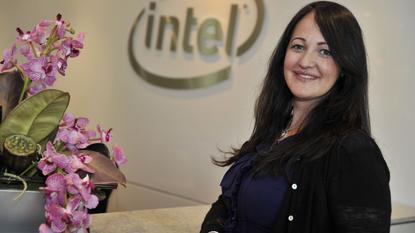From CMO to CEO: Intel Australia's Kate Burleigh
- 31 July, 2013 10:53

If you want to make your way to the top in business, it pays to play to your strengths.
That has certainly been the plan for Intel’s MD and former marketer, Kate Burleigh, although the starting point for her journey up the executive ladder was an unusual one.
Burleigh chose communications as her primary field of tertiary study, over more usual selections such as commerce or business studies. But 20 years later it is a decision that has paid off, with Burleigh stepping into the managing director role for Intel Australia in April 2012.
“I had a plan that I wanted to work in business, and I was pretty aware that communications was one of my stronger suites,” Burleigh says. “So I figured I would probably succeed most in business if I worked my way up through a communications stream.”
That decision landed her a public relations role in the 1990s at electronics retailer, Dick Smith. She soon realised the limitations of that position.
“Once I started to work and understood more how business worked, I decided that really I wanted to work for a multinational company,” Burleigh says. “I knew to do that, I would need to attain formal qualifications.”
In 1996 she commenced an MBA, and later that year fulfilled her multinational ambitions when she landed the PR manager role for Intel Australia. That position proved the launching pad for a number of increasingly senior roles within the company, including national marketing manager in 2006 and now managing director.
Along the way Burleigh has worn various hats including Internet marketing manager, enterprise marketing manager, and a regional marketing role related to the launch of Intel’s Centrino mobile processing platform. This saw her performing a variety of tasks and working with regional telecommunications companies to develop their Wi-Fi strategies.
“I took that regional role because it expanded out my regional knowledge of how we do things on a regional level,” Burleigh says. “There is a point where once you decide you do want to have a general management role in a large company like Intel, you actually have to study the nature of the business and how decisions are made, and expand your thinking to an international footprint.”
Burleigh says each step has been a deliberate choice to increase her skill set. In 2004 she took on the role of retail channel and OEM marketing manager for Australia, working with Intel’s larger retail and manufacturing partners to ensure pull-through of the ‘Intel Inside’ branding. Hence when she was appointed national marketing manager in 2006 she worked to regain the channel role as well, which was returned to her in 2010 in the expanded capacity of channel sales manager.
“This role was created for me, partly because we needed to shake up things in the channel sales area and partly because I needed to learn that side of the business,” Burleigh says. “The shake-up worked well and we managed to grow a market that had been stagnating for us. Part of that success came through fixing a disconnect we had between sales and marketing.”
In addition to career planning, Burleigh has worked hard to ensure her skills have been highly visible to her colleagues.
“One of the things I did have to work on a lot was making sure that people within the organisation who might have had a bias to sales or engineering knew that I had the ability to work in those roles as well,” Burleigh says. “People tend to typecast you. So I often say to my staff if they don’t make it clear what it is they want to do, don’t expect other people to work it out.”
While many CEOs come up through the sales channel, Burleigh believes marketing provides an advantage through building skills in selling one-to-many.
“I liked the idea of being able to influence on a broader scale than just the one-to-one sales process,” Burleigh says. “And that’s why marketing was so appealing. It is a form of sales – it is just selling one-to-many.”
Indeed, Burleigh believes her marketing experience will prove increasingly beneficial to her company.
“The tools we are using allow us to have much broader conversations with people, and it’s not all about the B2B sales anymore - we are able to go one-to-many,” Burleigh says. “It’s a good time for marketers, but you want to keep those skill sets up.”
Other CMO to CEO success stories
Follow CMO on Twitter: @CMOAustralia, take part in the CMO Australia conversation on LinkedIn: CMO Australia, or join us on Facebook: https://www.facebook.com/CMOAustralia

